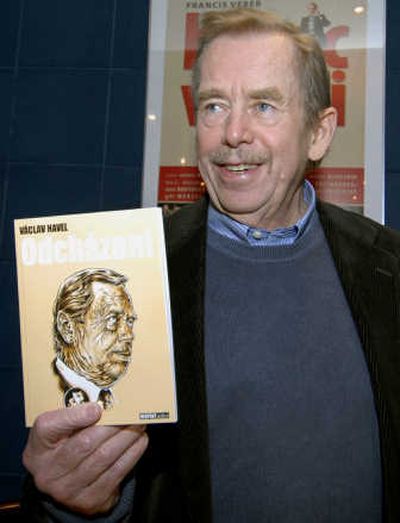Presidential playwright

PRAGUE, Czech Republic – The play is about the leader of an unspecified country who leaves politics after many years in power and has to adjust to a new life.
Its author may know a thing or two about the subject matter: He’s Vaclav Havel, the dissident playwright who led Czechoslovakia’s Velvet Revolution and went on to become president.
Havel, who stepped down in 2003, has returned to his original vocation with his first new play in almost 20 years. “Leaving” goes on sale Monday in the Czech Republic and will have its premiere in June at Prague’s Na Vinohradech theater.
The playwright readily acknowledges that his time as president influenced the writing of his five-act play but insists it isn’t autobiographical, saying he started working on it in the 1980s at time he couldn’t even dream of being president.
“I think some journalists or viewers may try to see it this way,” Havel, 71, recently told Czech radio. “But I don’t think producers will do that because I am in contact with them and I explain a lot to them.”
For Dr. Vilem Rieger, the main character of “Leaving,” stepping down as chancellor is traumatic: The new government kicks him out of the state-owned villa he occupied for years and his personal life is thrown into disarray.
Havel said the new work has loose associations to Shakespeare’s “King Lear” and Chekhov’s “The Cherry Orchard.”
“King Lear is also a ruler who lost power and his world began collapsing,” Havel said, adding that the Chekhov play is echoed in the theme of leaving home.
Czech director David Radok is directing the play, casting Havel’s wife Dagmar in a leading role. After Prague, “Leaving” is set to be performed at the Slovak National Theater.
Theater companies from several countries, including the United States, Britain, Sweden and Spain, have expressed interest in staging the play, Havel’s first since the 1998 “Tomorrow!” Translations are planned, under way or have been completed in nine languages, including English, said Jitka Sloupova of the Aura-Pont agency, which represents Havel.
Havel has some advice for anybody planning to stage “Leavings.”
“Based on 40 years of experience in the staging of his work, the author believes that if this play is to resonate properly, it must be acted in a civil manner, seriously, soberly, normally,” Havel said in a foreword to the play.
“Do not tart it up with grotesque movements, clever staging ideas, exaggerated gestures or intonations, mugging, biomechanics or anything striking that attempts either to explain, interpret or illustrate the text, or simply make it more amusing.”
Havel was already a well-known dissident playwright when he led the 1989 Velvet Revolution that peacefully toppled communism. He became president of Czechoslovakia in December 1989 and continued in that role until 1993 when the country split into the Czech Republic and Slovakia.
Since the 1960s, Havel has published dozens of plays, books and political essays.